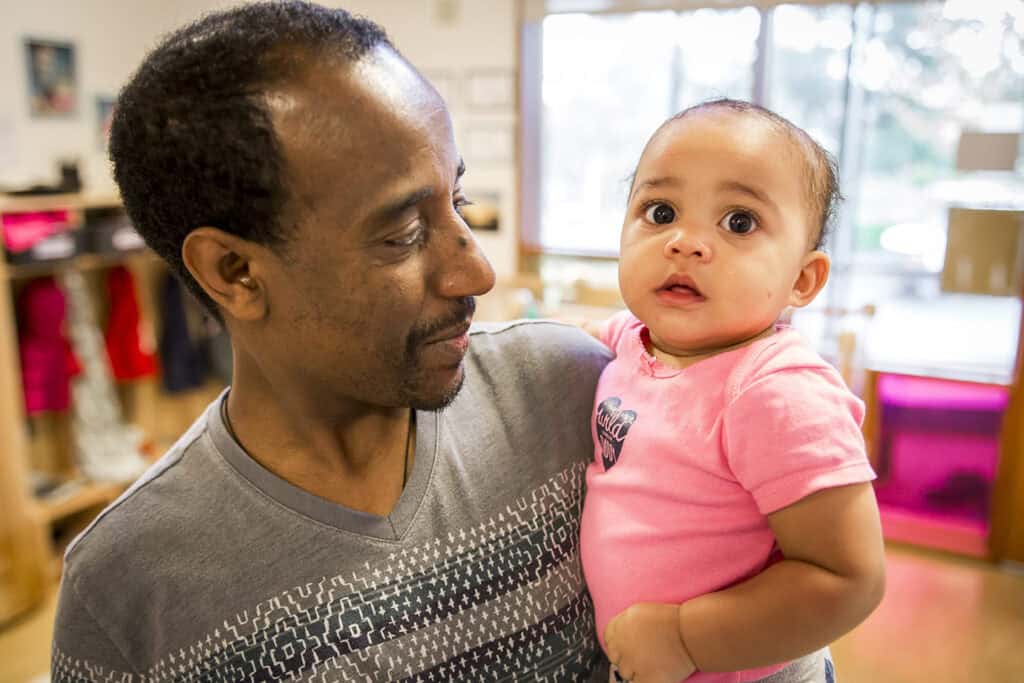As a national collective of schools, families, community partners and early childhood champions, the Educare Learning Network sets kids up for success in kindergarten and beyond.
In their early years (ages 0-5), experiences in a child’s life dramatically shape their development – and such experiences often unfold in early childhood education (ECE) contexts. Participation in ECE fosters positive development, particularly for children and families from underserved communities, and impacts learning, behavior and overall well-being as a child grows. In fact, a higher dosage of high-quality ECE (i.e., starting at younger ages, spending more time in ECE settings, etc.) has shown to have particular developmental benefits.
Here’s what we’ve learned from exploring how timing and length of enrollment in Educare are related to children’s developmental outcomes!
Educare DC: Growth in Language, Literacy and Social-Emotional Development
All 25 schools in the Educare Learning Network are data-driven programs, meaning they are committed to utilizing data to deliver high-quality, effective teaching, learning and family supports while steadily improving their programs over time.
To this end, each school engages in regular cycles of data collection, analysis and interpretation throughout each school year via a Research Practice Partnership (RPP) with a local evaluation partner (LEP). In this partnership, LEPs are tasked with continuously assessing child development, classroom quality, and staff outcomes and sharing relevant findings with their schools and the early childhood field.
Educare DC is proud to work with Dr. Brenda Jones Harden of the University of Maryland as their LEP. Over the past years, Dr. Jones Harden and the LEP team explored relationships between the amount of time children spend in Educare and their developmental outcomes. Data across multiple years (from 2013-2019) showed that children who attended Educare DC for 4+ years had positive growth in their language, literacy and social-emotional development skills.
Gains in Language & Literacy
- Children benefited from longer time enrolled in Educare DC. Specifically, longer enrollment was associated with higher language skills, with children’s scores approaching and even exceeding the national average. (When these children were first assessed at Educare DC, they were scoring below the national average.) Scores were measured using the Preschool Language Scale (PLS) Assessment, a comprehensive language assessment focused on both receptive and expressive language skills.
Positive Social-Emotional Development
- Longer time spent at Educare DC was also associated with higher levels of initiative, including self-esteem, self-confidence and independence. These social-emotional skills were measured using a strengths-based assessment called the Devereaux Early Childhood Assessment (DECA).
These data add to what we know from first-hand experience: Educare DC makes a big difference in the lives of children and helps them build the foundation for success in kindergarten and beyond.
“This analysis of our 2013-2019 data represents normal operations pre-pandemic,” shares Hannah Urrey, director of development and communications at Educare DC. “It is a reminder of what works – that Educare works – and of the critical importance of the work we do. After all the challenges of COVID, we still know what works and how to support children. It’s a really powerful representation of progress. It is validation, affirmation and motivation.”
Read more about this research in Educare DC’s 2021 annual report.
Educare Learning Network: The Role of Timing & Length of Enrollment
Across the broader Network of Educare schools, multiple studies have also explored and confirmed that the amount of time that children spent in Educare was associated with positive developmental outcomes. Data from multiple schools show that:
- Longer enrollment in Educare was related to children’s positive language development, social-emotional skills and school readiness.
- Regardless of the number of adversities experienced, children benefited from longer time enrolled in Educare settings. These benefits were even stronger for dual language learners (DLLs).
In short, starting earlier and staying longer at Educare is better – or, timing and length of enrollment at Educare play a positive role in children’s developmental growth and outcomes.
What’s Next
At Educare schools nationwide and across the ECE field, research indicates that timing and length of enrollment in high-quality early care and learning influence children’s growth and development.
However, barriers and challenges remain – disruptions to school and family life, lasting effects of the COVID-19 pandemic, and more. But together, we can expand ECE access, advocate for comprehensive and inclusive public policies, and continue to show up for our children, families and communities.
Here are a few next steps to consider:
- Learn more about timing and length of enrollment in our Educare Insights brief.
- Engage with policy work like the Early Head Start Child-Care Partnerships.
- Stay tuned for an upcoming webinar that brings together research, policy and practice on timing and length of enrollment, and focuses on navigating current conditions for successful recruitment, enrollment and attendance in ECE!
